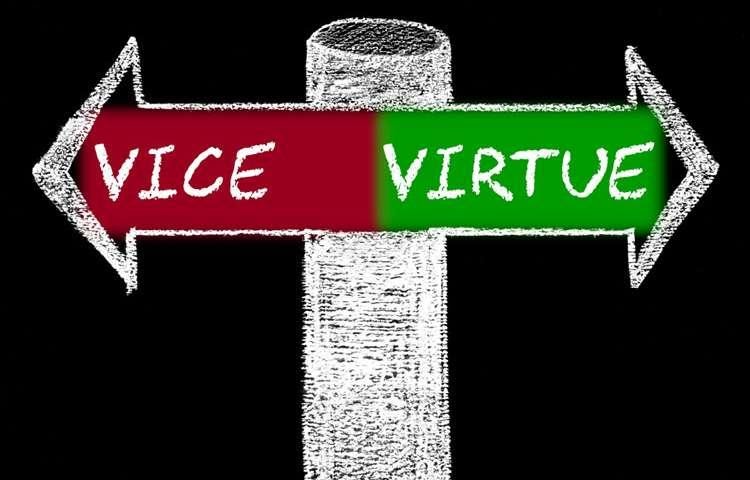
In this article, we will talk about what causes others to sin or to remain virtuous. What does it mean to be virtuous, and how can we recognize others’ virtues and vices?
In Stoic philosophy, virtues are considered to be the highest good one can attain. Therefore, living with arete (virtue or excellence) became the main principle of every Stoic thought and action. Furthermore, the Stoics named four cardinal virtues: wisdom (prudence), temperance, courage and justice. However, all virtues are considered one, because they have a common source: a mind that lives in accordance with nature.
All virtues are connected, so one can’t be “half-virtuous”. Virtue comes from our ability to distinguish the things that are in our control (our mind and will), and things that lie out outside our control (all external things, including other people). The same goes with vices. Vices are the opposite of virtues and in a traditional sense they also considered sins.
From a Stoic perspective, our sins are the product of misconduct in our lives. Just because you live a life of vice doesn’t necessarily mean this is an active decision or that you are aware of it. In this respect, ignorance is the fertile ground that vices develop on. We will continue to explore this topic to find the main source of all virtuous and vicious thoughts and deeds, and the reasons why people follow virtue or succumb to vice.
The Nature of Virtue and Vice
The ancient Stoic philosophers were deeply influenced by Socrates. The founder of Stoicism, Zeno of Citium, admired Socrates’ character so much that he founded his school of thought on Socratic philosophy and ethics. Socrates thought that virtue equals knowledge, while ignorance is vice. If we know that certain actions are good, we will view those actions accordingly.
Therefore, all our mistakes must be the product of ignorance. This ignorance is significant, because ignorance can impact whether we live with virtue or vice. If one knows this difference, then one will not become sinful. As Socrates believed, everyone follows what they “know”; however, that knowledge can be false and that is the same as ignorance. In this case, you are not evil or sinful on purpose, but this does not undo the vice in your life.
Like Socrates, all Stoics believed that virtue is the only good and that vices are the only bad. However, in Stoic philosophy, virtue is inclusive of self-knowledge, although virtue isn’t reduced to knowledge itself. Virtue is living in accordance with nature and reason.
Furthermore, living in accordance with reason is related to knowing the difference between ourselves and external things. This knowledge shows us how to divide reasonable and virtuous thinking from acting with a sinful mindset. Socrates and the Stoics considered knowledge the most important aspect of ethics. Therefore, without knowledge, virtue would become impossible. This is why their ethics are an intellectual ethics.
The Path of Vice and Ignorance
We will now see what a path of vice looks like from the perspective of Stoic philosophers. How does one become sinful? Well, we can divide this process into five parts on how we can act sinfully without realizing it:
- You are not living according to reason. You are not recognizing yourself as a mindful being.
- You aren’t aware of the difference between things that are in your control from those that aren’t.
- Ignorance of the above principle leads to suffering, because one is eager to control more than you can.
- You don’t see the boundaries of control and you blame fate or others for life’s misfortunes.
- You ultimately end up suffering, which leads to mindlessly hurting yourself and others in the process.
The path of virtue is the exact opposite of the above process. We can see now how ignorance is the key culprit for all our misfortunes and struggles, or as Marcus Aurelius would put it:
“…the people I deal with today will be meddling, ungrateful, arrogant, dishonest, jealous and surly. They are like this because they can’t tell good from evil.”
Marcus Aurelius










